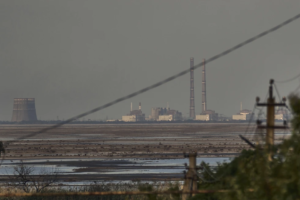‘When you’ve been raped, beaten, humiliated and lost everything, it’s hard to have hope.’
Pascale Solages
Help us amplify vital stories and drive change in underreported crises.
Co-founder and general coordinator of NÈGÈS MAWON, a feminist organisation based in Haiti

Surviving sexual violence in Haiti: As part of the 16 Days of Activism against Gender-Based Violence annual campaign, and as gangs in Haiti subject women and girls to appalling levels of sexual violence, this series of intimate accounts highlights the harms they endure and the necessity of include survivors’ voices in shaping the policies that affect them.
NEW YORK, United States
Long a chronic harm for Haitian women and girls, the use of gender-based violence (GBV) has grown dramatically in scale and ruthlessness during the country’s ongoing political and security crisis, with gangs now deploying sexual abuse as a routine means of torture and control.
According to a recent UN report, several local sources in different part of the capital, Port-au-Prince, said there was a “worrying increase” in cases of rape and other GBV in gang-controlled neighborhoods and displacement sites between April and June this year. In some areas, service providers reported receiving an average of 40 rape victims a day. Many cases still go unreported.
Women’s rights advocates have been documenting these abuses and demanding urgent action for years, including in a formal hearing before the Inter-American Commission on Human Rights on International Women’s Day in 2023. That action is still missing 20 months later, as women and girls endure ever-growing abuses in an effective vacuum of government services and anaemic international action. Overstretched local organisations, themselves ravaged by insecurity and humanitarian collapse, are often the sole providers of services and care.
The painful physical, emotionally devastating, and often lonely experiences of Haiti’s women and girls can become lost in the immensity of the overall violence, or seem almost abstract as the assaults become so routine.
Survivors rarely get invited to the policy meetings dedicated to confronting GBV. Bearing witness to their pain and to their exhausting struggle to survive – and committing to take responsive action – should be a true imperative of the International Day for the Elimination of Violence against Women on 25 November and of the subsequent 16 Days of Activism against Gender-Based Violence.
Rather than limit the campaign to clever slogans, glossy photos, and high-level events, this year there must be a rallying cry to do better to ensure Haiti’s women and girls have adequate support and resources, and to lift their voices and expertise in shaping policies and practices to address the causes of GBV in the first place. Their experience must be part of the conversation – and action.
In collaboration with Nègès Mawon, the Haitian feminist organisation I co-founded to support survivors and to advocate for tackling the structural causes of GBV, The New Humanitarian will publish, weekly, the stories of six women who survived brutal sexual violence by gangs.
These testimonies are based on interviews conducted by women who play the role of their marraines (“godmothers” in french) in one of Nègès Mawon’s assistance programmes. The marraines, who are themselves long-time survivors of GBV, counsel, support, and accompany more recent survivors in their attempts to recover.
5 November 2024
Gabrielle: “I have the courage to move forward”
Gabrielle (her name has been changed for safety reasons) arrived with a delighted smile at the Hôtel Villa Thérèse in the Port-au-Prince neighbourhood of Pétion-Ville in May 2024 to join a painting and co-creation workshop organised by Nègès Mawon for the women the organisation supports.
This was her first time meeting other survivors of GBV and participating in this type of activity. Her marraine’s presence at the room’s entrance calmed the anxiety she had felt since boarding the bus from the refugee camp where she lives in Centre-Ville – the capital´s downtown.
Born in 1975, Gabrielle grew up in Carrefour-Feuilles – now one of the areas most affected by violence – and took courses in secretarial work, computing, sewing, cooking, and pastry-making. She uses these skills to bouske lavi a(hustle for life) and support her six-year-old daughter.
Haiti’s security crisis has displaced more than 700, 000 people. Gabrielle is among them. In September of last year, a gang attacked her neighbourhood in broad daylight. She was outside of the neighbourhood at the time and watched in horror as images of murder and looting appeared on her phone. She did not return home, seeking shelter instead with a friend.
In December last year, she risked returning to her home to retrieve essential items, including her cooking and sewing equipment, her daughter’s clothes, and medication for her bedridden partner, who suffers from a foot tumour and diabetes. The neighbourhood, once lively with children, street vendors, and music, was now a hauntingly silent scene of looted homes and deserted streets. A police tank patrolling nearby gave her some reassurance, but she remained on edge.
As she stood at her front door, a group of armed men appeared, shoving her inside. They were gang members evading the police nearby. She was held for five hours, subjected to brutal beatings, rape, and threats, while the gang members vandalized her home. All the while, police officers patrolled mere metres away.
When they left, the gang members stole everything, including her car. She slept in the house that night. She was bleeding and half-conscious. She was in too much pain and too afraid of the dark to go anywhere. Early the next morning, she cleaned herself up as best she could and made her way to the Hôpital Général, Haiti’s largest public hospital.
She arrived before 7am and was the second person to pass through the hospital gates when they opened. But she had to wait to see a doctor until 2pm. Stigma and discrimination are among the many burdens survivors of sexual violence carry in Haiti. Gabrielle’s injuries and trauma were not considered urgent enough to necessitate immediate attention.
She fell asleep on a bench in the hospital maternity ward. When she woke up, people were pointing at her and whispering, “Se li menm, se fi yo fè kadejak sou li a” – It’s her, it’s the girl who was raped.
A nurse finally showed her empathy and took control of her treatment. Gabrielle underwent a series of tests before being given antiretroviral drugs (ARVs) to prevent a possible HIV infection and prescriptions for a long list of medications to buy. There was no rape kit, no psychological assistance. no medical certificate, and no referral to a women’s organisation for further support.
Haiti has an official national plan to fight violence against women and girls that sets out how public hospitals are supposed to care for rape victims, and the state is obliged to make resources available. But all of this was ignored.
Gabrielle told no one about her ordeal. She returned to her friend’s small home, concealing her pain. Days later, her partner was hospitalised. On 30 December, Gabrielle reached out to Lunie Joseph, a famous Haitian journalist, asking for help to see a psychologist. After posting a public appeal on social media, Lunie referred her to Nègès Mawon.
At the end of December, when she connected with the organisation, she was met by the warm voice of one of the marraines, Stéphanie Boucher, on the phone. Gabrielle immediately broke down in tears. This marked the beginning of daily support messages from Stéphanie, who checked in regularly, while Lunie also called her frequently.
These conversations, mostly while she cared for her partner, were a lifeline for her in a country where institutions don’t work and sexually assaulted women face insurmountable hurdles before they can start recovering physically and mentally. When her friend could no longer house her, Stéphanie found her a donated tent. Gabrielle set it up in the yard of a friend’s empty house. The tent provided minimal shelter, but it was safer than the streets.
In January, after her partner was discharged from the hospital, Gabrielle was able to begin regular sessions with the organisation’s psychologist, but a month later she decided to stop all contact with Nègès Mawon and moved into a displaced persons camp at a school.
She hoped this decision would help her forget and move on. However, she continued to relive her traumatic experiences. The challenges of adjusting to life in a displaced persons camp only made things more difficult.
In May 2024, Gabrielle attempted suicide. She was taken to the hospital unconscious, but survived. Upon returning home, she reconnected with her marraine and resumed therapy sessions. The day she joined the painting workshop at the Hôtel Villa Thérèse, she danced, drew, talked, laughed, and cried, sharing the experience with other women who, like her, had survived unimaginable violence and trauma.
Gabrielle and her daughter still live in a displaced persons camp with several thousand others, lacking privacy and true security. She says that her daughter, who used to be very jovial, is now a sullen, withdrawn child who doesn’t understand why she lives in a school.
“School is for learning, Mom, not for sleeping,” she often says.
She wants to go “home” to her toys and the little car she used to drive around the playground.
Despite the ongoing difficulties, today, Gabrielle says she feels alive again.
“I feel like a human being again… I can talk about what happened without breaking down”, she said. “When you’ve been raped, beaten, humiliated, and have lost everything, it’s hard to have hope. I understand that I’ll live my whole life with this wound, but I have the courage to move forward.”
Stéphanie Boucher interviewed Gabrielle in Port-au-Prince. Edited by Daniela Mohor.




